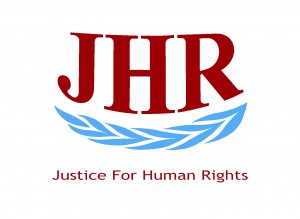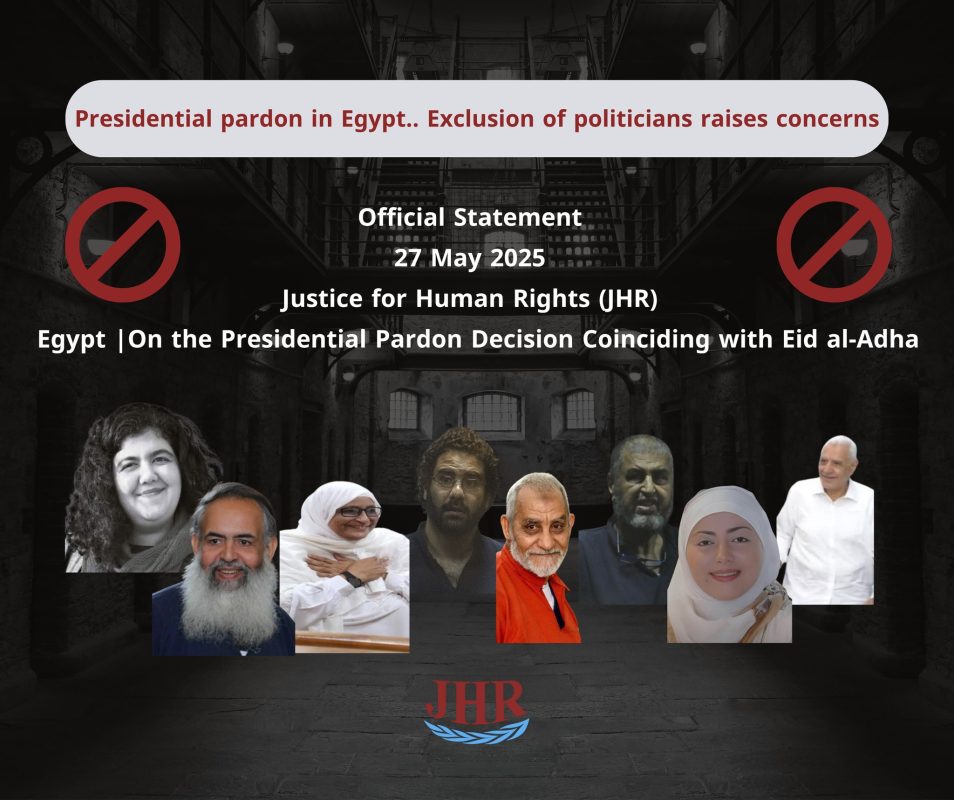Official Statement
27 May 2025
Justice for Human Rights (JHR)
Egypt | On the Presidential Pardon Decision Coinciding with Eid al-Adha
Justice for Human Rights (JHR) has followed the news of a new list of pardoned prisoners in Egypt, issued on national and religious occasions, which notably excluded political detainees and prisoners. Three years after the establishment of Egypt’s Presidential Pardon Committee, JHR has observed with grave concern the committee’s trajectory, which appears to heavily favor the release of individuals detained in criminal cases while almost entirely excluding political dissidents and those held on charges related to freedom of expression. This discriminatory approach raises serious questions about the committee’s true objectives and the state’s commitment to justice and inclusivity.
The Presidential Pardon Committee was established in April 2022 as part of Egypt’s so-called “National Human Rights Strategy.” Its stated purpose was to review the cases of pretrial detainees and those convicted in various cases, paving the way for their release by presidential decree. This move was cautiously welcomed by some political and human rights actors, who hoped it would mark the beginning of improvements in Egypt’s freedom record.
Over the past three years, the committee has announced the release of hundreds of detainees, with state media widely covering these pardons. However, an analysis of the lists reveals that the vast majority of those released were held in criminal cases, while thousands of political prisoners and opposition figures remain incarcerated with no substantial change. In fact, new arrests have continued.
The Exclusion of Political Detainees: A Disturbing Pattern
From cases where individuals have been held in pretrial detention for years over charges linked to their media or political activities—while others in criminal cases were released after shorter periods—to instances of repeated arrests and prolonged detention without concrete evidence of violence or terrorism, or charges of “spreading false news” or “misusing social media” for expressing opinions, the continued imprisonment of dissidents casts serious doubt on any claims of genuine political or human rights progress in Egypt.
This systematic exclusion sends a clear message: the Egyptian government still views freedom of expression and political opposition as threats to national security, unworthy of “pardon.”
The Consequences of This Approach
The persistence of this discriminatory policy has several negative repercussions:
– It deepens the human rights crisis and exacerbates the frustration of families whose loved ones remain imprisoned for political reasons.
– It erodes trust in official institutions and undermines the credibility of any steps purportedly aimed at improving human rights.
– It reinforces the marginalization of peaceful dissent, stifling dialogue and increasing societal polarization.
JHR’s Call to Egyptian Authorities
Justice for Human Rights (JHR) urges the Egyptian authorities to:
– Immediately and unconditionally release all prisoners of conscience, ensuring they are no longer excluded from pardon decisions.
– Open the public sphere to peaceful freedom of expression—the only path toward a stable, prosperous society where citizens’ rights, as enshrined in international covenants and domestic laws, are respected.


